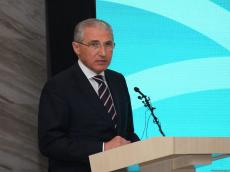|
|
TODAY.AZ / Business
Azerbaijan’s COP29 envoy: $300 billion is not enough, we need $1.3 trillion
19 May 2025 [13:50] - TODAY.AZ

COP29 President and Azerbaijani Presidential Envoy on Climate Issues Mukhtar Babayev has urged developed countries to significantly raise the level of climate financing for adaptation and mitigation in developing nations.
Speaking to Nepal’s The Kathmandu Post on the sidelines of the Sagarmatha Sambaad climate summit, Babayev warned that current levels of funding are insufficient to effectively combat global warming.
“Previously, in 2009, 15 years ago, $100 billion was pledged. In 2022, the figure reached above $100 billion for the first time. And in 2024, donor countries at first proposed only $250 billion,” Babayev noted. “In this case, we started working with our partner countries to push the donor countries in the global North to increase their contributions. Finally, after long discussions, we agreed on at least $300 billion. That is not a fixed figure; it can be more than $300 billion.”
He emphasized that expectations, particularly from developing countries, were much higher: “There were expectations from different countries, especially the developing world, that the financing would be in trillions. With the requests and demands from developing countries, it was also decided that the COP29 and COP30 teams would prepare a special ‘Baku-to-Belem’ programme—to increase the contributions from $300 billion to $1.3 trillion. We need other stakeholders, such as multilateral development banks, international financial institutions, and the private sector to bridge the gap between $300 billion and $1.3 trillion.”
Babayev said work on this program has already begun with the Brazilian COP30 team: “We’ve spoken to all parties for their recommendations, comments, and advice on developing this programme properly. However, it is still in development.”
He also praised the climate summit in Nepal for highlighting urgent regional and global challenges: “Discussing climate issues here in Nepal is crucial. We had several panels, and we participated in discussions and gave speeches. As a keynote speaker, I had a chance to make an intervention. We met with the parties, climate specialists and scientists. All the participants—country leaders and ministers—expressed their worries and concerns over the glaciers in the Himalayas. That’s why it is timely for the government of Nepal to organise such an important meeting.”
According to Babayev, Nepal must now act quickly to translate these discussions into action. “It is now essential for the country to mobilise resources, engage scientists, learn from the discussions and enhance capacities to prepare adaptation measures, as it is not possible to stop climate change, or to postpone it. It is moving very fast, and as you mentioned, global warming is causing significant changes in the environment, substantial changes in biodiversity and major changes in glaciers and other aspects of our daily lives.”
He welcomed Nepal’s updated climate commitments: “It was a great pleasure for all of us, especially for the COP29 members, to receive the new Nationally Determined Contributions (NDC) from Honourable Prime Minister KP Oli. He presented this document to the COP29 team, and it’s very ambitious. I think it demonstrates how Nepal is planning to contribute to nature and the climate, and motivates maximum mobilisation of resources to address these problems.”
Babayev concluded by underlining the importance of regional inclusion in the global climate agenda: “It is important to organise such forums in different parts of the world. Since the start of this year, we have already visited various countries in Africa, Europe, the US and Latin America. It is also crucial to focus discussions in Asia. Especially in this region, it is vital to bring the challenges, impacts, requests and needs of the countries into the international agenda.”
“That’s why I think it’s so important that we support such a significant event in Kathmandu. I believe this also conveys another positive message within the context of the preparations for COP30 itself. It’s essential to place issues such as the protection of glaciers and water resources at the centre of discussions during COP30 in November.”
URL: http://www.today.az/news/business/259229.html
 Print version
Print version
Connect with us. Get latest news and updates.
See Also
- 14 November 2025 [12:29]
ASCO’s new “Khojaly” vessel embarks on major Australia–US transit - 13 November 2025 [11:04]
Fitch affirms Azerbaijan Mortgage and Credit Guarantee Fund’s ratings with stable outlook - 12 November 2025 [15:16]
Azerbaijani companies participate in Turkmentel-2025 International Exhibition in Ashgabat - 12 November 2025 [12:42]
Azerbaijani mind behind new era of digital trust in American healthcare - 11 November 2025 [13:28]
New digital system simplifies short-term leave approvals in Azerbaijan - 11 November 2025 [12:26]
Nearly half million Azerbaijanis benefited from Employment Programs in 2025 - 07 November 2025 [15:17]
EU: Azerbaijan’s gas exports vital to Europe’s energy independence - 07 November 2025 [10:00]
SOCAR and Sinopec sign framework agreement on energy cooperation - 06 November 2025 [14:59]
Amendments to tax code aim to boost investment, economic activity, says official - 05 November 2025 [15:35]
Azerbaijan to raise social assistance threshold to ?300 as of next year
Most Popular
 Eurasian logistics without Azerbaijan? An untenable myth
Eurasian logistics without Azerbaijan? An untenable myth
 President Ilham Aliyev receives ADB delegation
President Ilham Aliyev receives ADB delegation
 Central Asian leaders to sign major multilateral package at 7th Consultative Summit in Tashkent
Central Asian leaders to sign major multilateral package at 7th Consultative Summit in Tashkent
 National Library participates in international congress
National Library participates in international congress
 Leyla Aliyeva participates in environmental initiatives during Mingachevir visit
Leyla Aliyeva participates in environmental initiatives during Mingachevir visit
 Bern hosts Azerbaijani Culture and Victory Day
Bern hosts Azerbaijani Culture and Victory Day
 Azerbaijan summons Russian Ambassador after Iskander debris hits Baku Embassy in Kyiv
Azerbaijan summons Russian Ambassador after Iskander debris hits Baku Embassy in Kyiv
